Hello dustbunnies, and welcome to a much more casual round on Substack than we usually do. There’s… a lot going on in the world right now.
Iran vs. Israel vs. (for some reason) the United States. RFK fired the government’s entire vaccine advisory board and replaced them with an unbelievable number of anti-vaxxers and anti-vaxxer-adjacents.
A man dressed as a police officer with an incredibly unsettling Halloween mask assassinated Rep. Melissa Hortman from Minnesota and her husband, Mark, and shot Senator John Hoffman and his wife Yvette about eight times apiece.
A man named Vance Boelter, an evangelical Trump supporter, was arrested for the shootings and then became the center of a vast conspiracy theory on Elon Musk’s Twitter, where the worst of the worst falsely accused Tim Walz of hiring him to assassinate Hortman (it’s so obviously false - which didn’t stop Senator Mike Lee and Elon Musk from signal boosting it).
We’re covering most of that and more over on TikTok and Instagram right now, so be sure to follow along as we report any and all updates. But unfortunately, there’s one important thing happening in the month of June that’s falling a bit by the wayside…
Pride. A month for the gays. A month for the lesbians. A month for trans folks, bi folks, queer folks, every one of my favorite letters of the alphabet and more. And it’s being overshadowed (mostly) by an incredibly petty straight man trying to drag us into World War III and a whole lot of insane shenanigans that simply would not have been possible without a climate created and fostered BY that man.
News is going to break at any given minute about any of these stories, and it’s not going to be good news. But right here, at the middle of the month, while I’m vibing in Anaheim for VidCon, I wanted to take a moment to talk a little bit about how proud I am to be a gosh dang lesbian.
There’s been an incredibly divisive conversation about what it means to be a lesbian this month. For instance, Jojo Siwa, the young dancer-turned-popstar, claimed to have invented “gay pop” shortly after she came out as a lesbian - only to find herself in love with a much older MAN name Chris Hughes. The conversation goes a little something like this: many queer folks are calling, or at least implying, that Jojo is a traitor. Many others point out that there’s nuance in your sexual identity; identity, and sexuality, are fluid. Considering yourself a binary ANYTHING can be restrictive at times.
Nobody should be mad at Jojo Siwa for exploring her sexuality. But I do find that stories like Jojo Siwa, as well as Fletcher (more on her later) tend to hold interesting places in the way we as a society are conflating queerness and “being a lesbian,” which is contributing to the erasure of… well, being a lesbian.
Let me back up a bit.
Back in October, when the future seemed bright and it started to reaaaaaally look like Kamala Harris was going to be president, I wrote about some work I did for Olivia Travel - an all-lesbian travel group that sells trips and packages to predominantly lesbian customers. But what I didn’t mention was that Olivia Travel began originally back in 1973… as a record label. BY and FOR women.
Judy Dlugacz. Ginny Berson. Meg Christian. These are just a few of the legendary women behind Olivia Records, a twenty year endeavor that was founded for $4,000, and represented what Wikipedia summarizes as a part of a “1970s lesbian sub-culture by providing a public platform for the expression of topics that were lacking in dominant political discourse, and helped consumers develop strategies to cope with, organize, and articulate their experiences.”
Olivia Records was radical for a 1970s lesbian collective, man. Their earliest sound engineer was a trans woman named Sandy Stone, who the Olivia Collective defended with their blood, sweat, and tears against what Trans Advocate refers to as incessant “TERF violence” that led to her leaving due to death threats levied against her and the Collective. They were a huge inspiration to gay girls all over the world - including Melissa freaking Etheridge, who sent a demo tape to Olivia when she was younger, got turned down, and KEPT THE LETTER EVEN STILL.
You know the saying - nothing gold can stay, but happy gays will age. And as Olivia’s more quaint femme singer-songwriter aesthetic gave way to more outwardly angry queer genres like riot grrl, it became too hard to keep up - so they hung up the towel. But then Judy Dlugacz had a million dollar idea: what if we take the message of Olivia Records, and the safety in numbers approach to fostering safe spaces for lesbians, and put it all in a travel company?
That’s Olivia Travel, baby.
I had a lot of really interesting conversations during my time with Olivia Travel last October. But the ones I remember the most were with a lot of the elder butches onboard - the types of ladies that many younger queer people would default to assuming are gender-non-conforming. Instead, the conversations tended to revolve around my identity, and the identities of other folks like me that identify as queer, non-binary, they/them, etc. These talks were respectful, and understanding - but they also provoked a larger talk about lesbian culture, and the idea that the power of being a woman loving women was disappearing from the world in favor of something else.
In the context of other queer people, I can’t agree with the idea that bi and/or queer and/or gender-non-conforming people are “erasing” lesbians. Not happening, Jack.
But in the context of me, it suddenly began to hit me that I was ignoring an incredibly large part of my identity. I AM a lesbian.
Back in 2016, Christina Cauterucci wrote an article for Slate called “For Many Young Queer Women, Lesbian Offers a Fraught Inheritance.” She examines the similarities and differences between self-identified queer women and self-identified lesbians:
“In the space between “lesbian” and “queer,” my friend and I located a world of difference in politics, gender presentation, and cosmopolitanism. Some of our resistance to the term lesbian arose, no doubt, from internalized homophobic notions of lesbians as unfashionable, uncultured homebodies. We were convinced that our cool clothes and enlightened, radical paradigm made us something other than lesbians, a label chosen by progenitors who lived in a simpler time with stricter gender boundaries. But with a time-honored label comes history and meaning; by leaving lesbian behind, we were rejecting, in part, a strong identity and legacy that we might have claimed as our own. While all identities are a product of their respective historical moments, starting from scratch is a daunting prospect. And so we’re left in a gray area of nomenclature, searching for threads of unity in our pluralism, wondering what, if any, role lesbian can play in a future that’s looking queerer by the day…
it’s hard to organize around a community without a name. I co-host monthly queer tea-dance parties in the warmer months, and my partners and I have struggled to promote our event to our desired audience. We called it a “ladies’ tea dance” for the first few years; one of my fellow co-hosts was a well-known trans guy in the community, and we thought his leadership would be enough to make it clear that anyone with social connections to queer women would be welcome, too. When some transgender attendees told us that the “ladies” terminology felt exclusive, we agreed, and started using the word queer on its own. But in D.C., as in most places, queer parties that get labeled without a gender often default to gay men, who crowd the rest of us off the dance floor. And while we’d never turn away cis gay men (one of our favorite guest DJs is one), I believe it’s important to carve out spaces that explicitly focus on women, especially as lesbian bars and publications shutter en masse. Basically, we wanted to promote our party to women—plus all queer or trans people who aren’t cisgender men.”
Those two paragraphs are part of a really revelatory and nuanced whole that outlines Christina’s struggle in grappling with the battle between forming a focused community and living a hyperspecific, or even willfully vague, reality through titles like “queer” or even more broadly, “not cis men.” She outlines how in the quest to become inclusive of everybody you want under the umbrella, you end up with something shapeless that can easily be overtaken by men in something intended to be more of a feminine space.
She makes it very clear that there is a lot of nuance in being queer. But she also makes it clear that there’s just as much nuance in a more “binary” label like lesbian, and when you embrace what it truly means to BE a lesbian, there’s power in that.
It was really freaking hard to come to terms with the reality of being gay when I was a teenager, it was really hard to come out of the closet to everybody I knew, and the elder gays reminded me a lot of the importance of BEING a lesbian and OWNING it.
I didn’t even know girls could BE gay as a kid. All I knew about gayness was what I learned from my mom’s gay guy friends and the drag queens of New Haven. So, I was in many ways socialized to be a gay man in a woman’s body (which explains my obsession with Liza, Judy, Musical Theatre, and my ORIGINAL life dream of growing up to LITERALLY be Robin Williams from The Birdcage.
As a teen, I even wondered while watching the Ricki Lake Show if marrying a drag queen would make me gay or straight. Was THIS the loophole I needed?! The worst thing you could be called as a woman in the 90s was a dyke - and I knew I COULDN’T be that, anything but that. It wasn’t until I went to my first “Dykes on Bikes” dyke night pride event in NYC that I realized… oh. OH. Dykes are the best.
It’s more important than ever for me to be a lesbian.
Especially when we live in a world where Obergefell is likely under attack.
In this June 10 report by Ruth Graham for the New York Times, it’s detailed how The Southern Baptist Convention voted overwhelmingly to begin advocating for the Supreme Court to overturn Obergefell v. Hodges. The Southern Baptist Convention is the United States’ largest protestant denomination, 12.7 million members strong, and hold a lot of influence with the nuttier sides of the evangelical right - aka the folks in power right now. Their platform is virtually identical with the religious side of Project 2025: calls for defunding Planned Parenthood, language about “safety and fairness in female athletic competition” (a transphobic dogwhistle), and of course - violently anti-abortion.
Like most protestant denominations, it’s intensely anti-woman and queer person. And it’s that part about Obergefell that really freaks me out on a daily basis. Because Pride isn’t something to me that I celebrate thirty days out of the year and keke at Target for their “chic Pride collection.” It’s something I live year-round. It’s something people fought long and hard, and in many cases died for.
If you’re over the age of 30, the death of the Target Pride marketing likely didn’t feel like a loss of culture. Because gay culture, to me, has always been small in-person groups that were louder and prouder than the stadium of a hometown team that just won the big game. Being gay is being resilient - knowing that the rights you spilled blood for can be taken away in an instant.
Which is part of why I find myself in an interesting place when it comes to Fletcher where I find myself frustrated - and not for the reasons you might expect.
Cari Elise Fletcher has made a name for herself as a modern queer icon. With songs like “Becky’s So Hot,” off of an album literally titled “Girl of My Dreams,” Fletcher was for the gays, by the gays through and through. But this year, she released a new song called “Boy” that got people talking because she came out and admitted she *gasp* kissed a BOY.
“I've been sitting on a secret,” she sings. “And I don't think I can keep it anymore. I've been hiding out in Northern California where nobody knows who I was before, where they won't judge me in the morning. We were counting down, the music stopped. We were waiting for the ball to drop. I closed my eyes and I leaned in… I kissed a boy.”
I’m sure some people are mad about this part of the story, but folks, if you fall on this side of the equation, grow up. Fletcher, for her entire career, has forgone labels of any kind, settling more on “queer” than anything, despite mostly dating cisgender women. The fact that she hasn’t publicly dated a man isn’t anything super revelatory, and the ironic play on scenario of Fletcher shakily admitting she kissed a boy and liked it probably seemed really fun in the studio.
But then… she has a little too much fun with it.
“It wasn’t on your bingo card this year,” she sings, in a song released during Pride Month, in what some might find to be just a bit too gleeful a tone. And then came the merch drop… all containing the word “Boy.”
To say that people in Fletcher’s fanbase were pissed might be an understatement; some have accused her of queerbaiting, some have even gone as far as accusing her of being an op.
Laura Beeching, a Crisis Management expert, called the situation “a masterclass in how not to handle audience connection:”
“Fletcher built her platform by writing explicitly about women, performing flirtation on stage, and speaking directly to a demographic that rarely sees itself represented,” Beeching writes. “For many fans, it now feels like that connection was used as a marketing tool. The criticism isn’t about her relationship, it’s about the erasure that comes when someone who built their name through same-sex storytelling suddenly pivots without context or care.”
But that’s the thing: I’m not even mad at Fletcher for dating a man. When I was a younger, less-evolved lesbian, I remember feeling BETRAYED when Ani Difranco married a man. When Alanis Morissette WASN’T GAY?!?!? But… the vibes…?! I think it leans on a kind of modern parasocial queerness that any of us would feel betrayed by this. At the end of the day, it’s her life. Her queerness. Her pride.
Fletcher’s story is why, now more than ever, I am unapologetically proud to be a lesbian in America, though. Queerness comes in all shapes and sizes, and one of the reasons this conversation is so hard to have is because it runs the risk of acting as a form of bi or queer erasure. The problem is not bi-ness or queerness, and anybody acting like the problem is Fletcher dating a man - well, YOU’RE the problem. Fletcher has always been unapologetically queer; the issue right now is that her reason for this rollout is unapologetically unclear. Even Sappho of Lesbos had a fling with a fella, and that resulted in a child… and we named LESBIANS AFTER HER!
Embrace who you are during Pride Month, whether you’re a gay cis man or a lesbian trans woman or a non-binary bisexual. Love yourself and love whoever your heart tells you to love. And if you’re a lesbian reading this right now: I see you, girl. Love yourself. Own it. Live it. I know I do: I’m a proud lesbian, with a big lessssssssssbian crush on my lesbian wife, and we’re just a couple of fun-loving dykes living in a world that wants to make us illegal. Happy Pride!!!


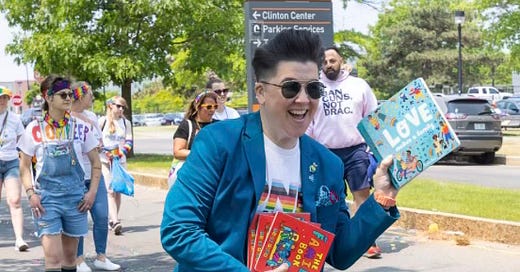



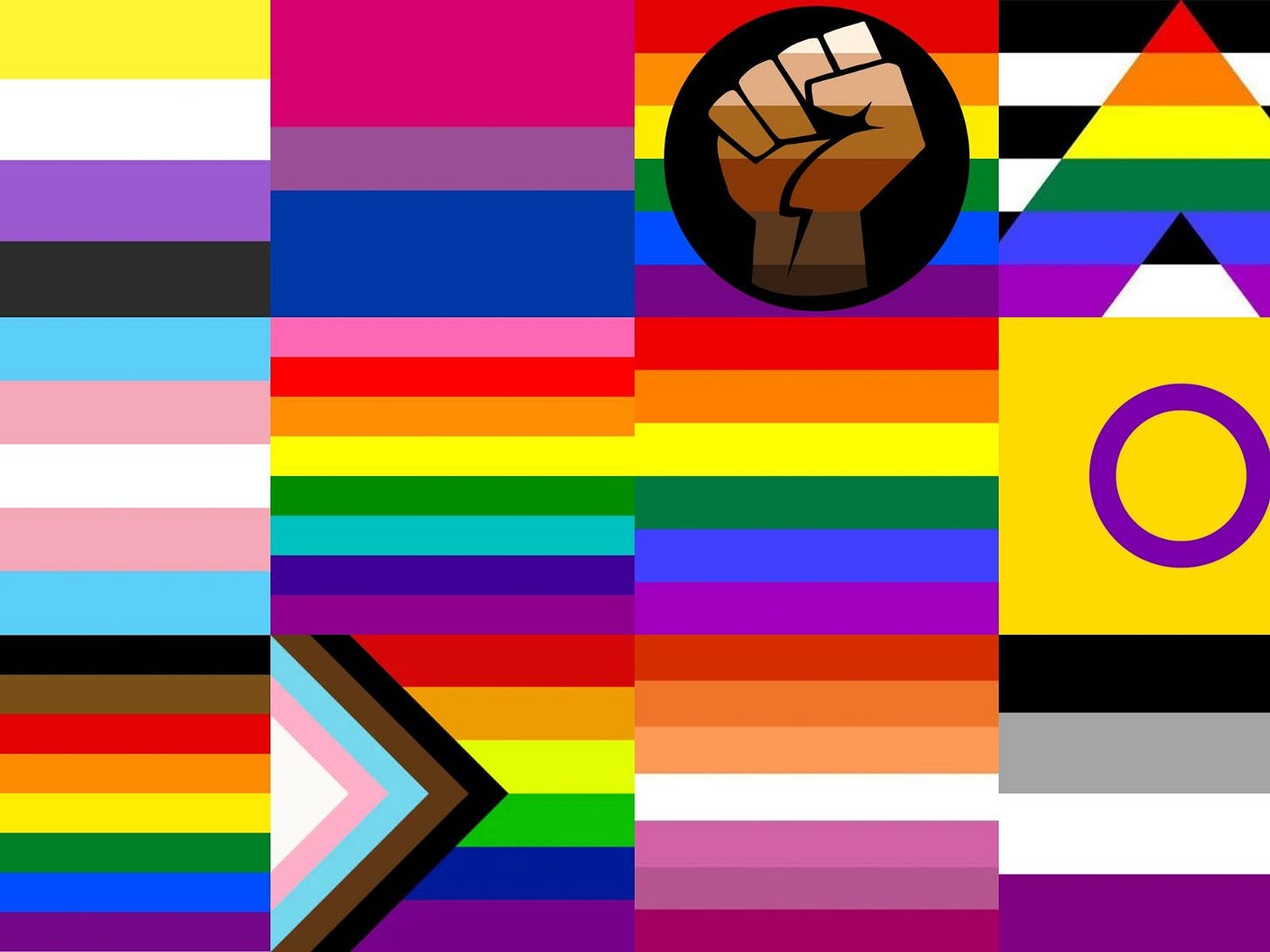
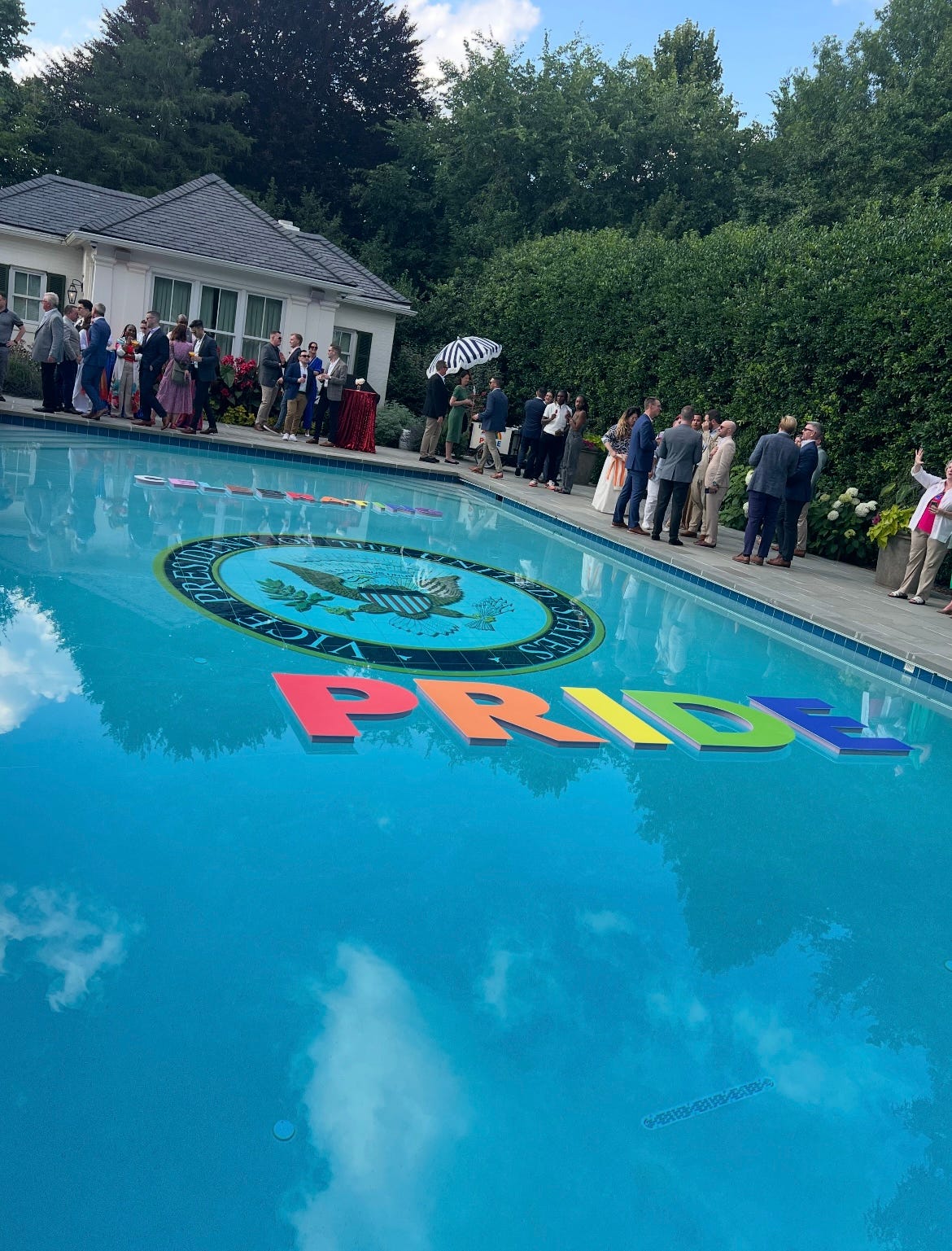
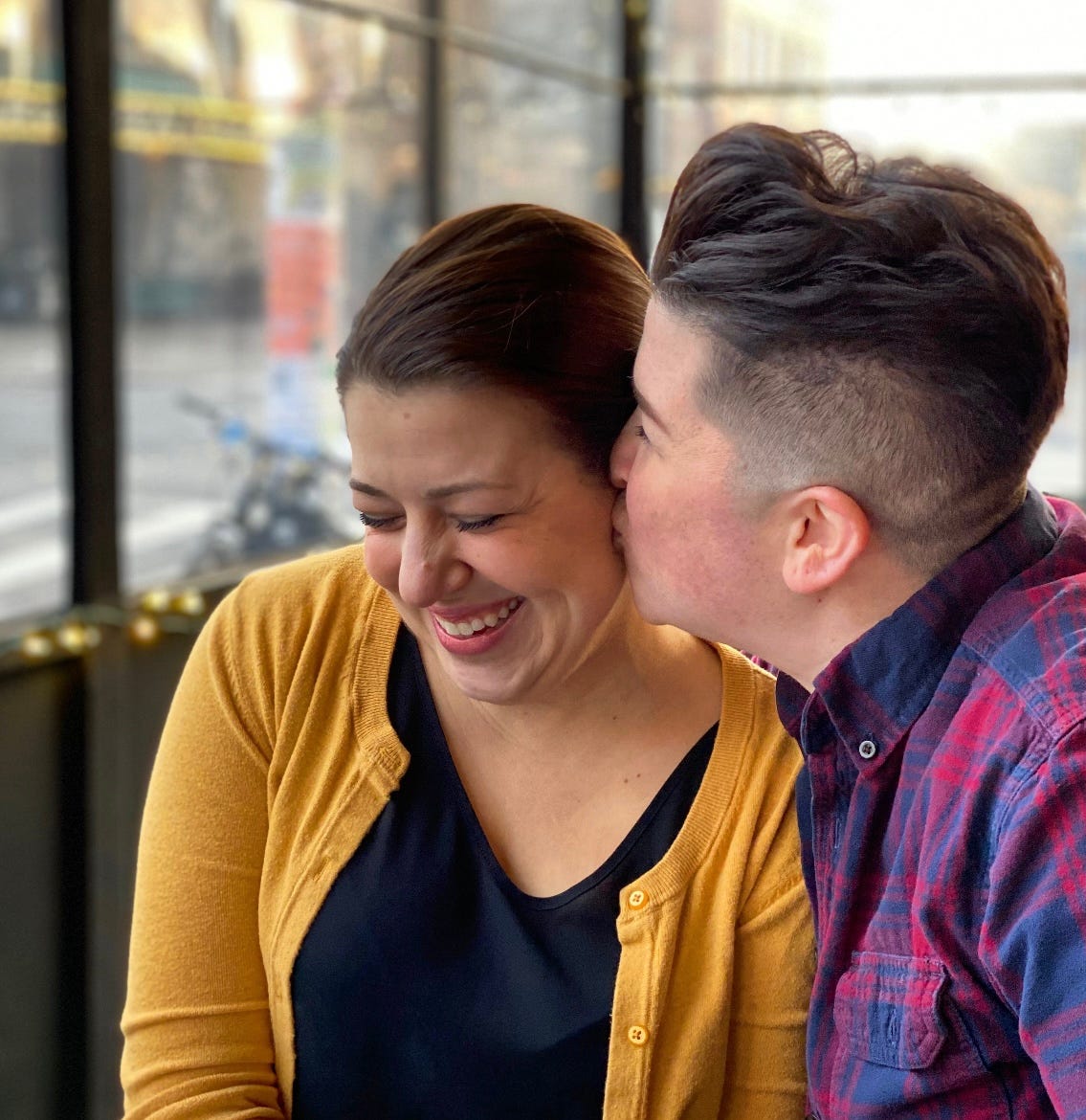
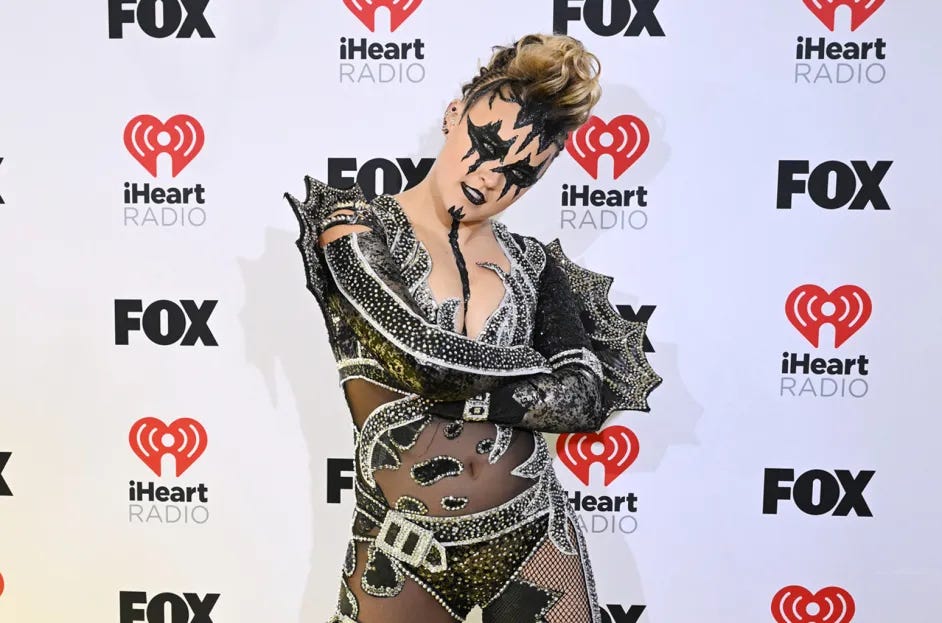
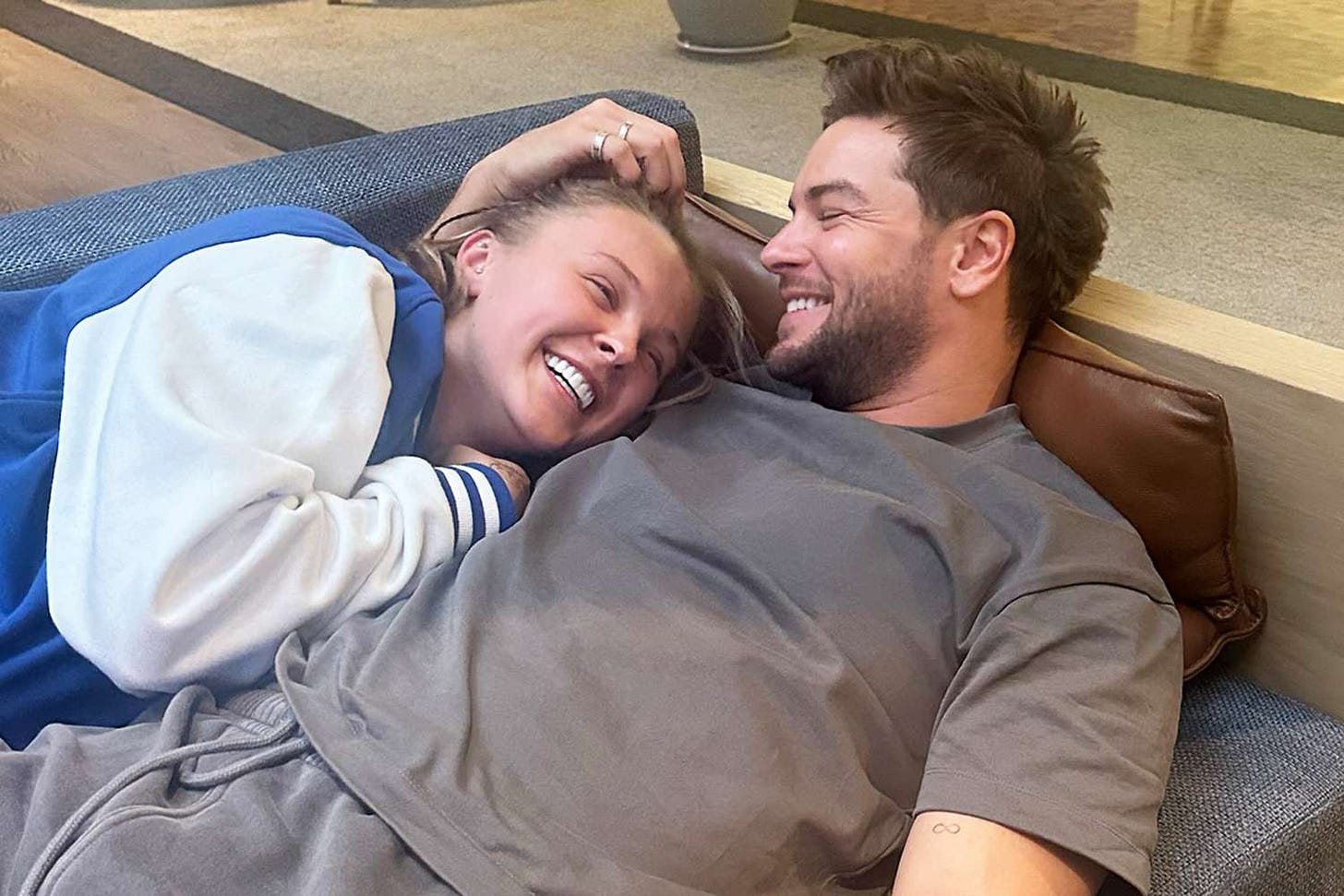

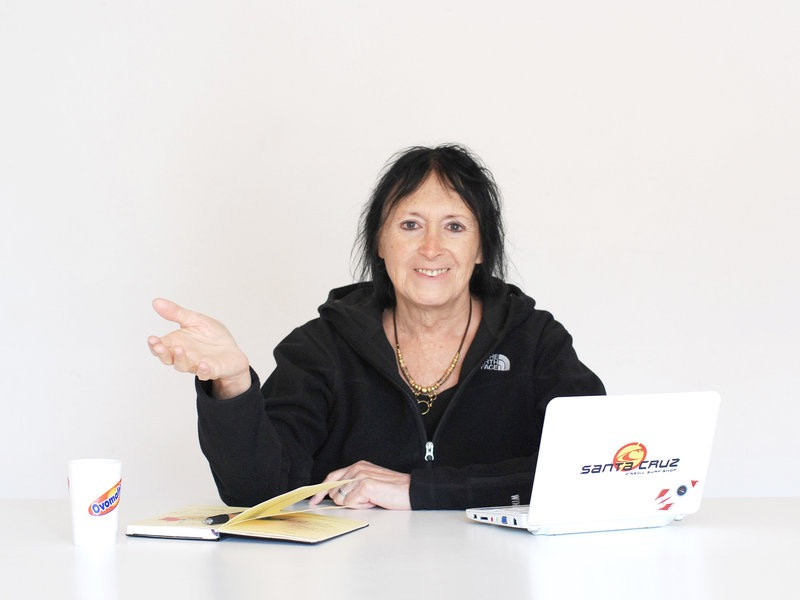
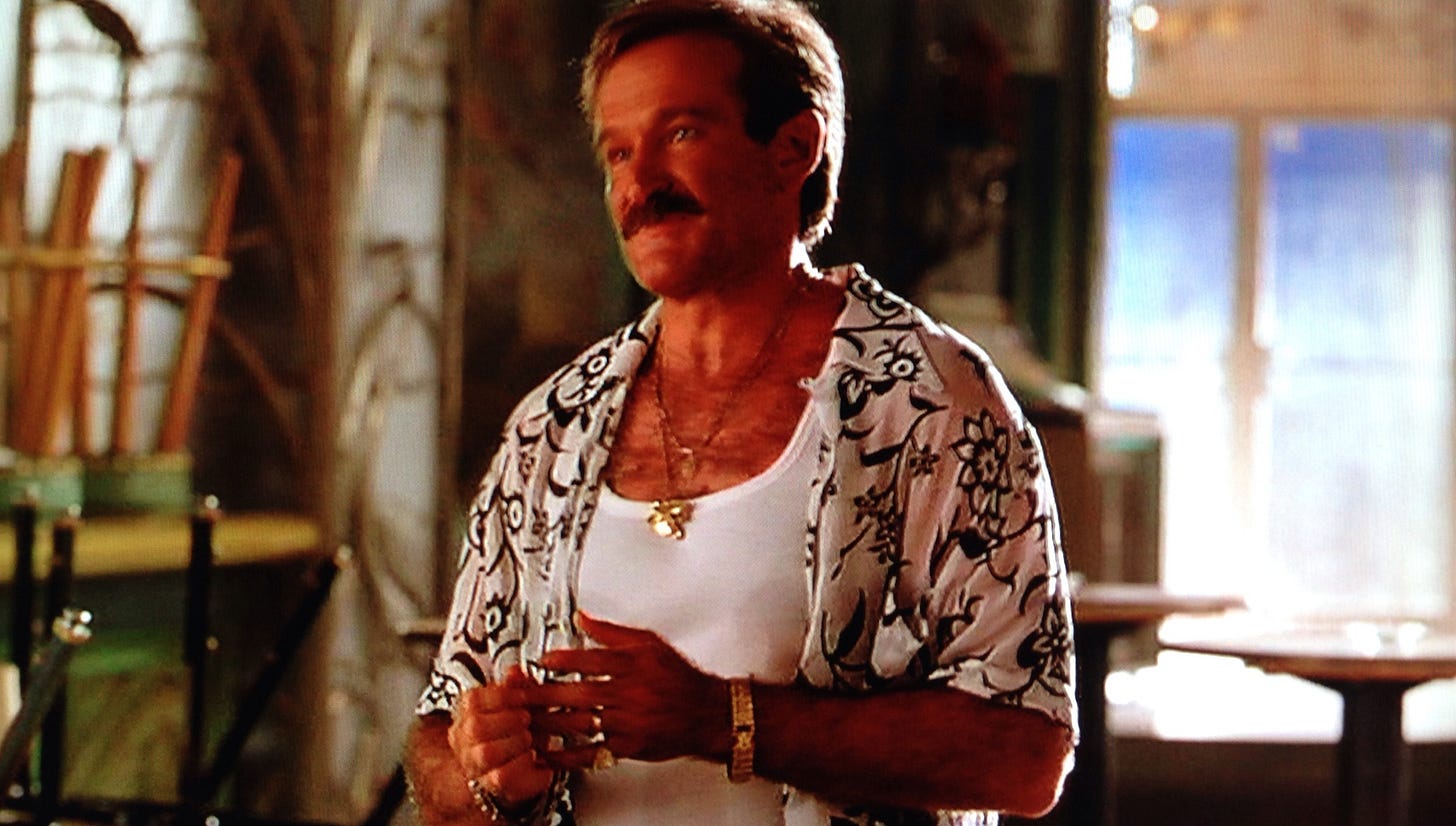
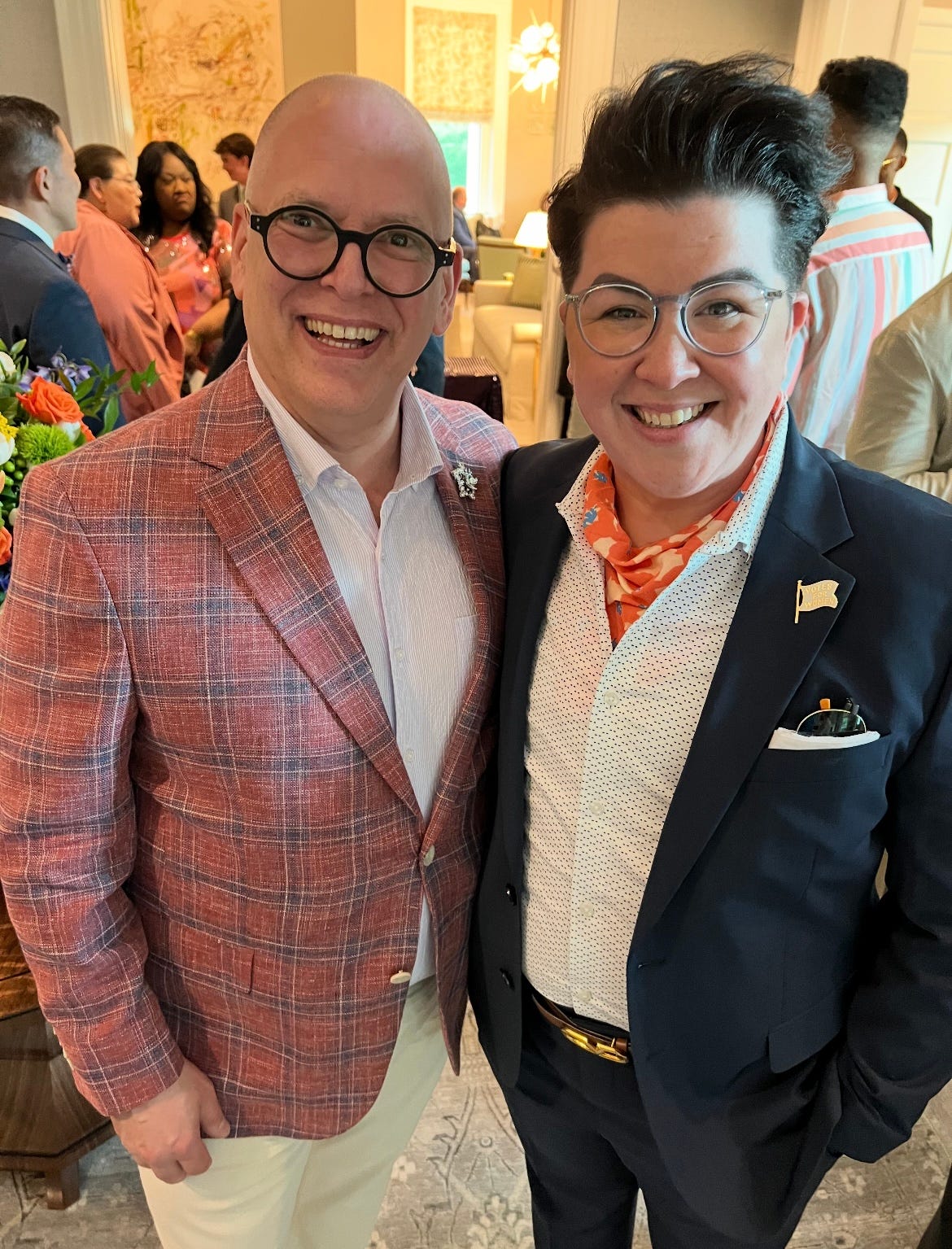
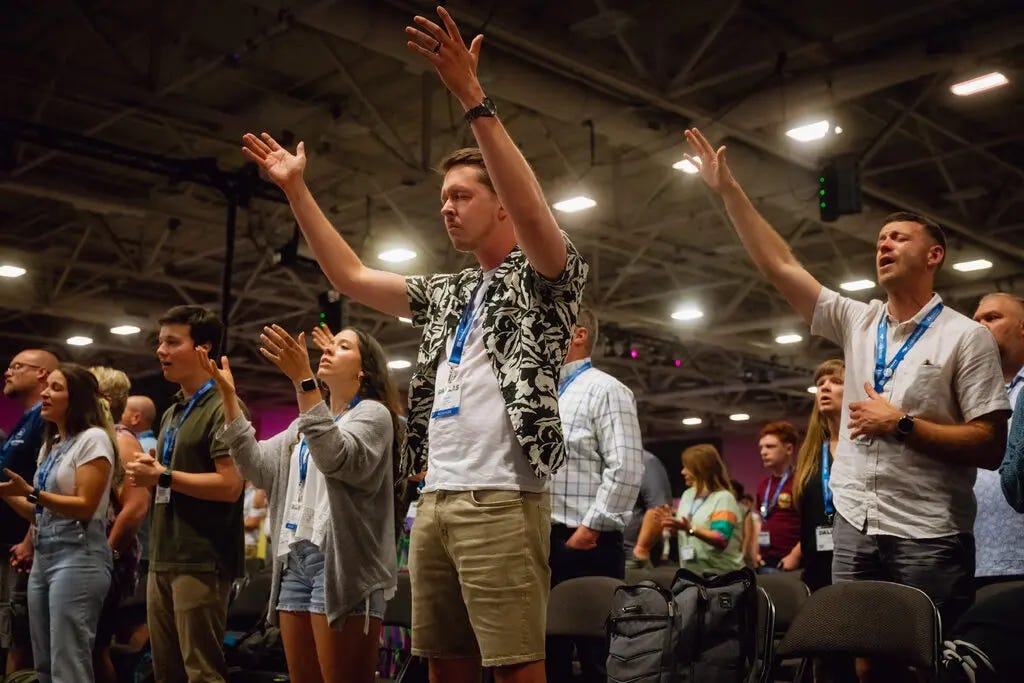
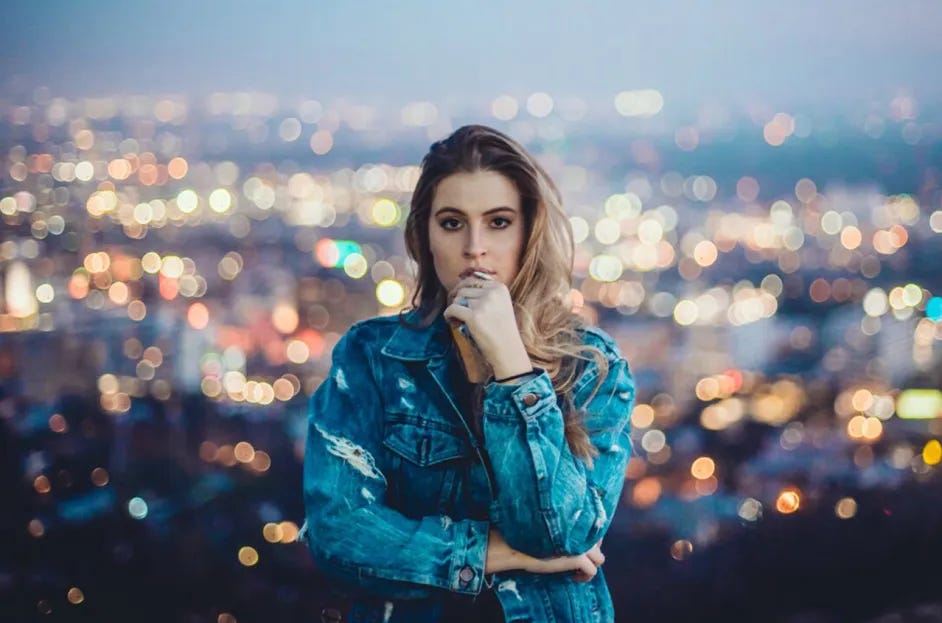

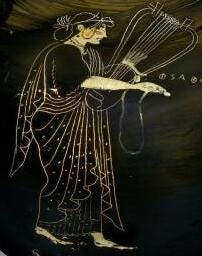
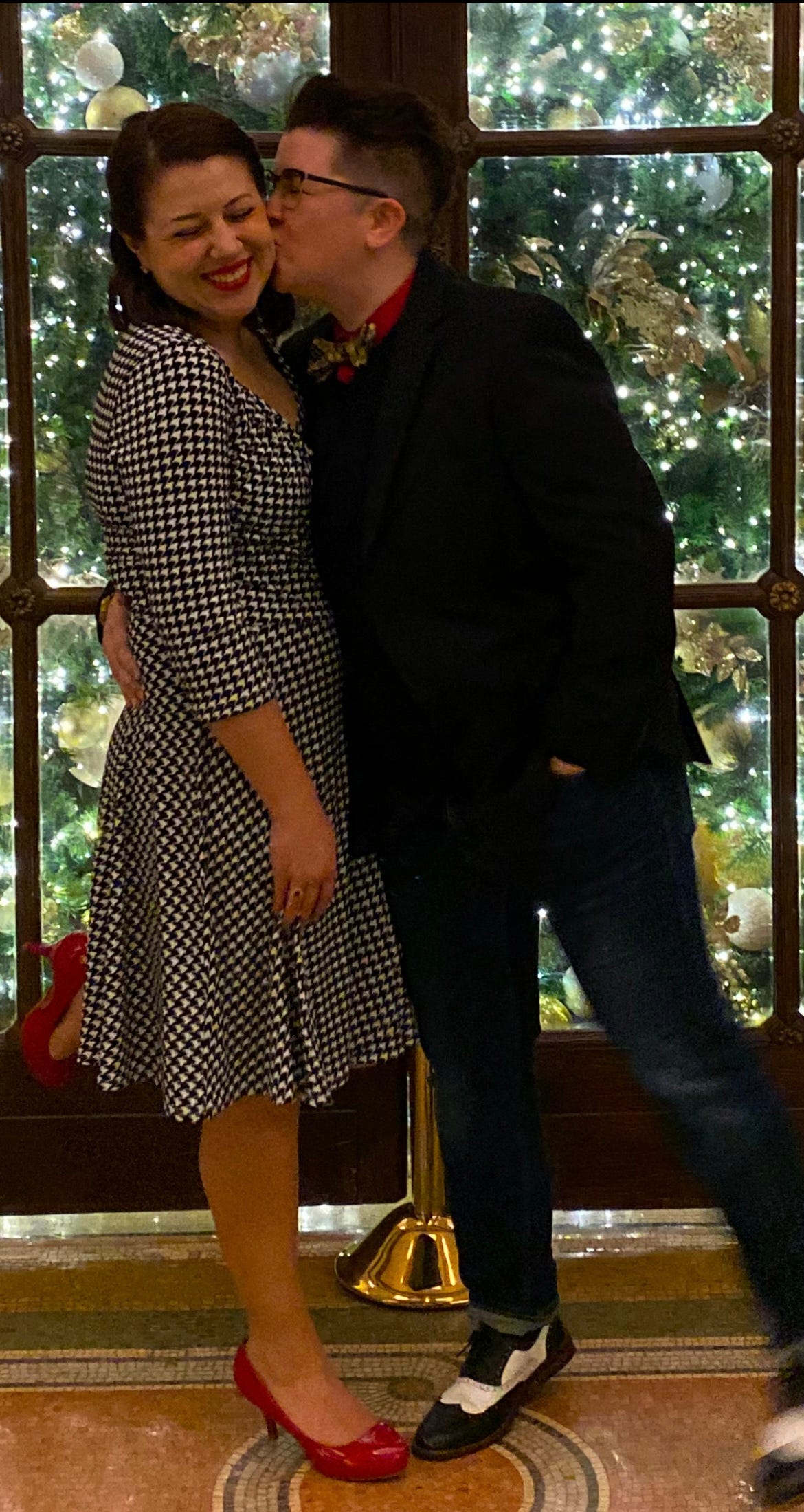
I truly adore and admire you and everything you do. As creepy as this might sound, I think of you offline and how much work and effort you put into what you do and I also think of your wife and how it all affects her as well. Someday I will meet you in person and I will want to give you a huge hug because I think you're such an incredible human being. Thank you for showing up every day for all of us, keeping us informed and sharing yourself with us.
Ok, now seriously, excellent essay. Makes me burst with pride. I’ve gotten about 5 of my friends to follow you, and after I share this, there will be many more.